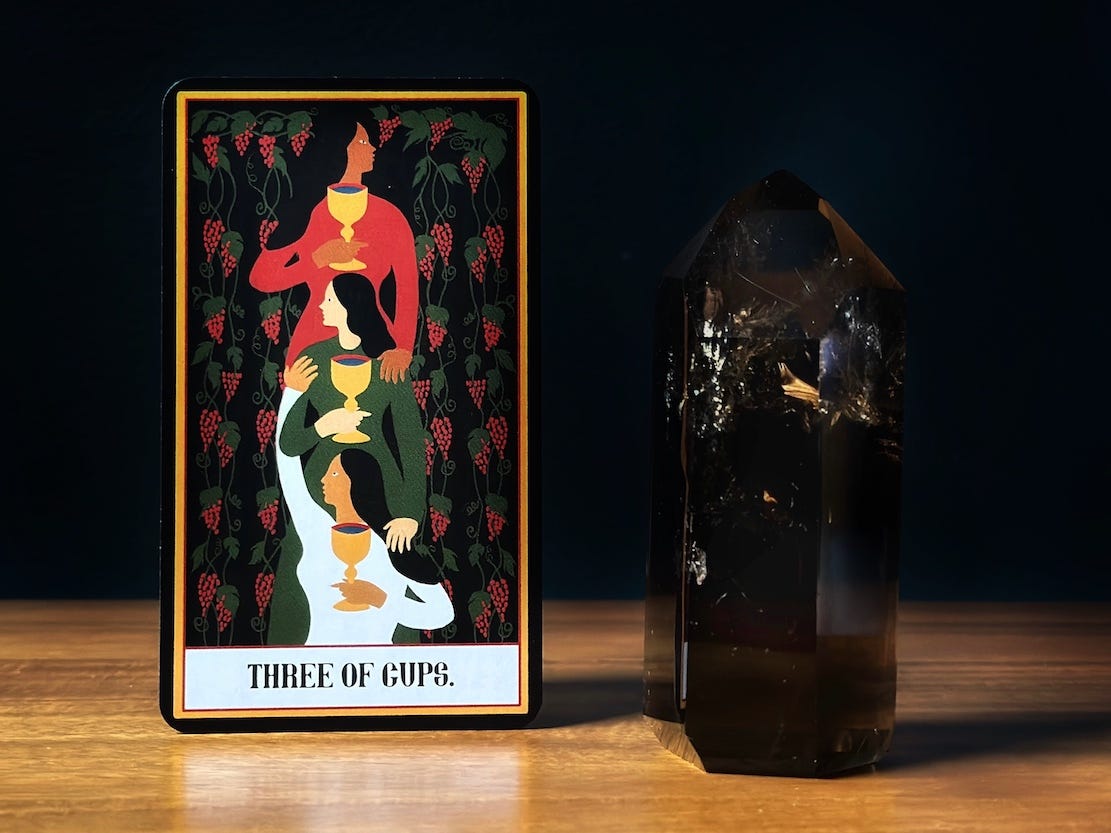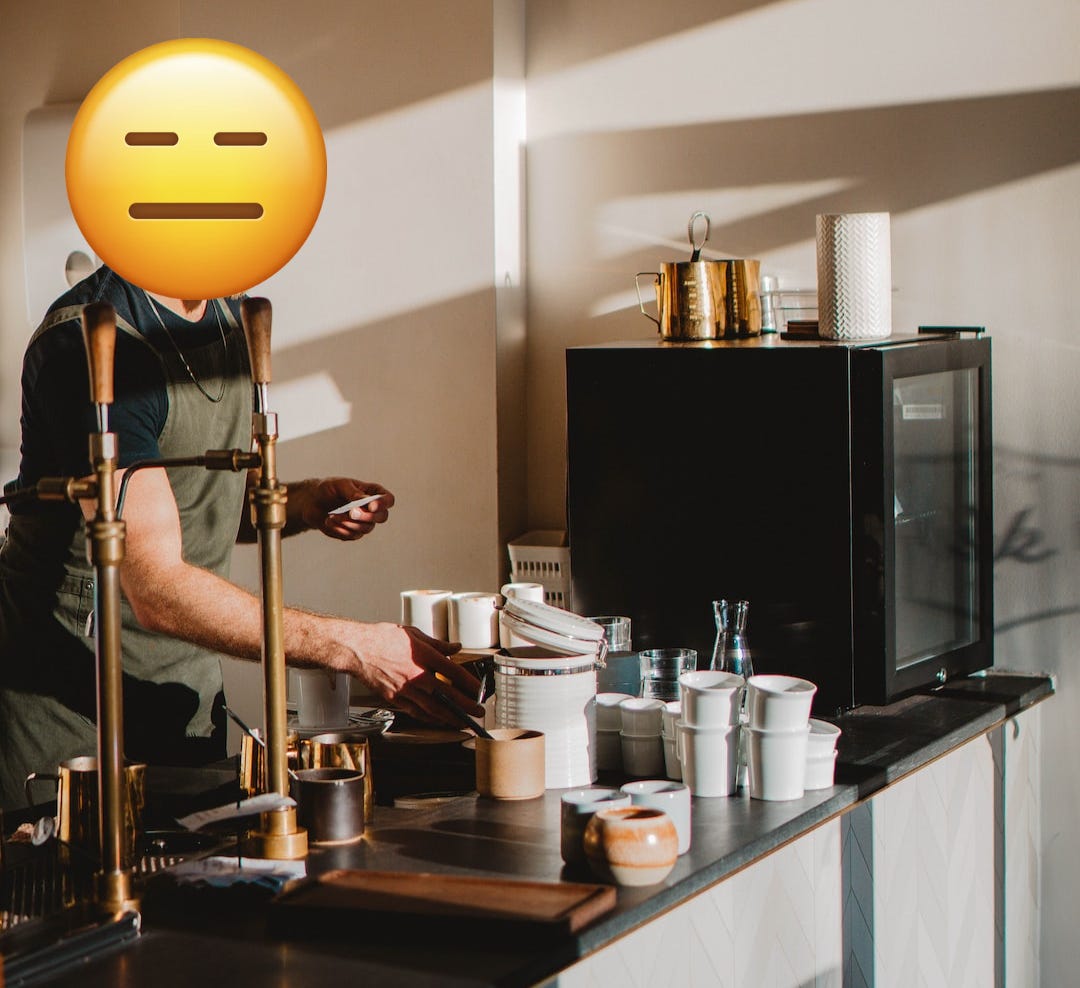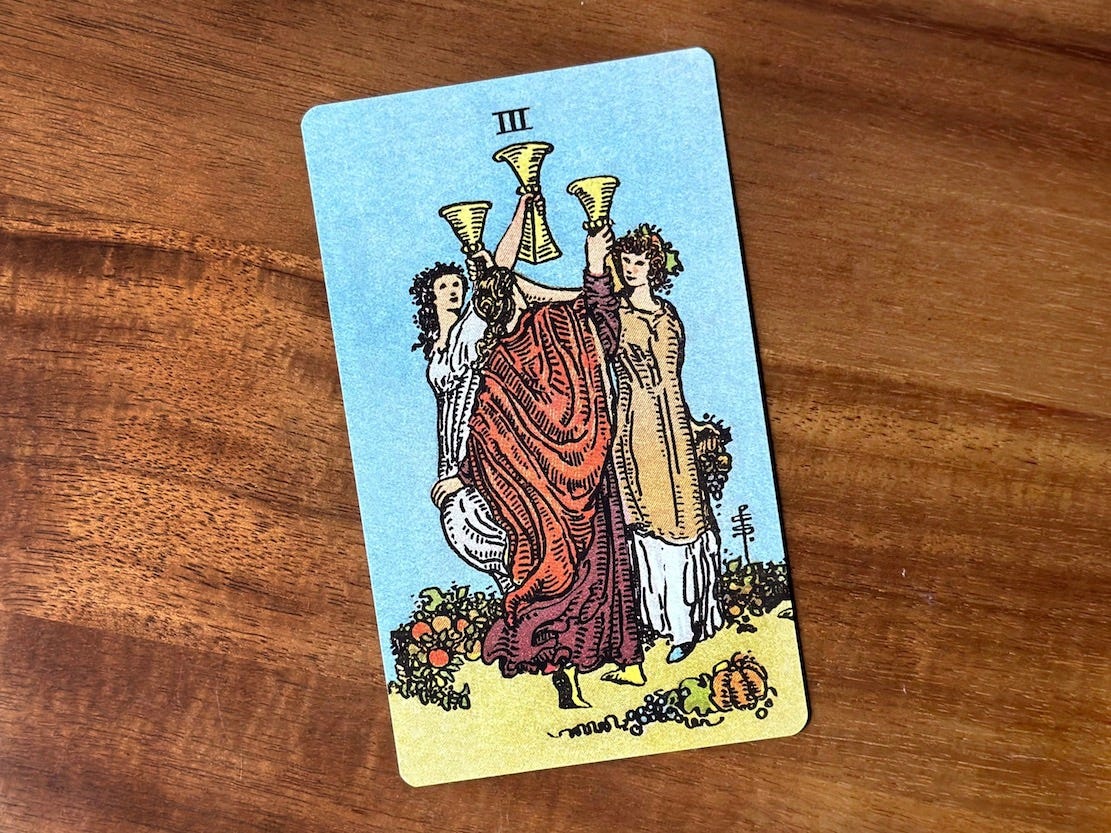My day begins with a visit to the mean barista.
He’s dressed in his typical uniform: NPR hat, art nonprofit t-shirt worn beneath an open flannel. I’d wager there’s a New Yorker tote stashed somewhere behind the counter. His face resembles that emoji composed entirely of straight lines, mouth a perpetually unamused dash, dismissing me on sight.
As his glare descends, decades of societal programming seep from my pores as I find myself growing friendlier to compensate for his lack of warmth. Kill ‘em with kindness, the saying goes, though I suspect the one it’s killing is me.
His answer to everything is a bored “of course.”
“May I have a banana bread?”
“Of course.”
“Thank you!”
“Of course.”
At the end of this interaction, I am left with a thought so ridiculous I’m going to present it as such before you have a chance to think it: Why doesn’t he like me?
My rational side knows the barista’s demeanor has nothing to do with me. He’s probably been awake since 5:00 A.M. Maybe a slew of rude customers soured his mood. Maybe he had a difficult life, or perhaps was over-indulged and now moves through the world with a petulant air. Maybe he’s worried — about his finances, his grad school finals, the health of a loved one. Whatever it is, it’s none of my business.
Still. I am bothered.
“I’m going to write about this!” I say, through a mouthful of banana bread, which is more than worth the side of attitude it came with. My partner informs me that “angsty Brooklyn barista” is a cliché. What can I possibly say about this person I do not know, whose existence I’ve reduced to a caricature?
But it isn’t about the barista. It’s about me, particularly the part of me that wants to please. The space that yearns to be filled with niceties and pleasantries and cheap validation.
The part that wants to be liked.
It is a truth universally acknowledged that other people’s reactions often say more about them than they do about us. We may accept that we are not responsible for other people’s feelings, nor their behavior. But it’s only human to sometimes take things personally.
We’re like little chemistry experiments, reacting everywhere we go. On the bus, at the gas station, in the grocery store. Add one compliment, a friendly smile, a rude gesture, a mean comment, and poof! Mood altered.
When I was younger, I often approached the world like a one-way transaction, in which my role was to impress or otherwise appeal to the other person. Dates, job interviews, conversations at a party — I’d find myself seated across a table from someone whose company I didn’t necessarily enjoy, wondering if they liked me.
It would take years to realize that I got to have an opinion. That there were two ingredients in this experiment, and our chemistry was the product of them both.
likable (adj.) – pleasant, friendly, and easy to like
“Like” is one of my least favorite words in the English language, right up there with “nice.” From a purely linguistic perspective, they’re tepid, passive. There is usually a more descriptive option.
To “like” something means it falls somewhere between “adore” and “tolerate.” We don’t love it; we like it. It’s fine.
Being liked is not the same as being respected. Or valued. Or understood. To be liked hardly scratches the surface. And yet, it’s often presented as something to aspire to.
A quick search uncovers article after article for “how to be more likable;” “the secrets of highly likable people;” “how to be the most likable person in the room.” Each one reads like a playbook in subtle manipulation. But the more I consider it, along with the other qualities on offer, the more I wonder, why would we want this?
If you were to ask me about the most likable people, past and present, I’ve encountered in my life, I would go on to describe a cast of characters who are quite different from one another but who are all very, for lack of a better term, human. They aren’t necessarily charismatic (though some of them are), but they are interested. Genuine. Curious. Encouraging.
Each one moves through the world in their own way. But in all cases, they don’t take great care to appear too perfect. They’re not afraid to show their cracks. When they ask questions, you get the sense they’re asking not to even out the conversation, or to appear engaged, but because they genuinely want to know the answer. They bring their full humanity to whatever they do.
In short, they care.
When we talk about a “likable” character — whether in literature or in life — what do we really mean? A person we relate to, perhaps. Someone we can root for. Someone whose company we’d like to keep.
In America, “likability” is considered a non-negotiable quality for those seeking public office, something pundits attempt to measure and track. But it is also intangible. How is one meant to acquire something when no one can actually define what it is? One might be deemed likable because they’re charismatic, steadfast, kind. Because they live in accordance with their values, because they have a point of view.
Ironically, the people we most admire — in popular culture and throughout history — are not always the most likable bunch. They may be polarizing figures. They may be controversial, anachronistic, or misunderstood. I’d posit part of what makes them so admirable is that their aim isn’t on public perception, but something greater.
When you share things with an audience, it’s hard not to worry about being liked. For one thing, most publishing platforms come equipped with a like button. A “like” is a vote of confidence. An easy compliment. A teeny tiny thank you note. A reflex. A quantifiable popularity barometer with a very real dopamine hit attached.
It seems that what all of us are after is something more profound. Something simpler, more inherent. To be known, seen, understood, connected. To matter.
We deserve more than being liked.
A “like” is conditional. It promises nothing. It’s a preference, a passing fancy. As a goal, it’s a moving target, a mirage, a carrot leading us astray.
The truth is, we can worry all we want about being likable, but in many ways, it’s out of our control. So our energy is better spent elsewhere.
The better question is, do you like it? Do you like the date? Do you like the art? Do you like the message? Do you like what you’ve just posted, shared, said, created?
Maybe that’s all that matters.
I like doughnuts.
I like meandering walks.
I like wearing the same black T-shirt over and over again.
I like banana bread, enough to brave a visit to the mean barista.
When it comes to people, my feelings are a lot more complicated. So is my understanding.
I doubt this is the last time I’ll wonder why someone does or doesn’t “like” me. But I’ll do my best to remember that we humans are a nuanced lot, and we owe each other a lot more than this. Including and especially ourselves.
Despite everything I just said, please feel free to like this post.
Card of the Week
Here is this week’s card for the collective, as well as some thoughts to carry into the days ahead. As most modern readers will tell you, the tarot is not about fortunetelling, nor is it about neat, definitive answers. The cards are simply one path to reflection, a way of better knowing ourselves and others through universal themes. If this reading resonates with you, great! And if not, no worries. Take whatever may be helpful and leave the rest.

Recently, I was on the verge of stopping this newsletter. But then something happened. I shared how I was feeling. And slowly but surely, you responded in many wonderful ways.
Whenever I see a new paid subscription or receive a new comment, I make a little gasp and join my hands together in front of my heart. This is involuntary. But it happens every time. I’ve been surprised by how much it moves me, that feeling of support, of recognition. I can’t tell you how much it means. THANK YOU.
Inspired by this, I wanted to do something to highlight and celebrate others, give back to subscribers, and help foster a greater sense of community. And so, I launched the Wednesday letters the way I do most things — suddenly, off the cuff, after pondering it for way too long.
It’s been the most wonderful gift.
I’ve learned so much from each guest, each week. And having this reason to correspond with different people has changed my work from endless, lonely typing to something much more dynamic and fulfilling. It’s given me energy and purpose. I can’t believe I wanted to shut this down, when now it’s all I want to do.
And so, I wasn’t the least bit surprised when I pulled the card for this week, and out came the Three of Cups.
In a nutshell, this card wants to remind us: 1) We are all connected; 2) You are not alone; 3) Everything is amplified when it is shared.
The Three of Cups carries a message of the good to be found in our relationships with other people. Not only our closest connections, but also acquaintances, passing associations, even those we may never meet.
Supporting others feels good, it turns out. So does asking for — and accepting — support.
Traditionally, this card often features a celebratory scene. Three friends dance together, golden goblets held aloft. Do they toast to one’s individual success? To a shared win? We’ll never know for sure, but the answer may just as well be that it doesn’t matter. Whatever it is, they feel it together.
Life events are amplified when they are shared. We see this modeled throughout our lives, from graduations and weddings to birthdays and housewarmings, our milestones marked by celebrations with others. And while this card encourages us to acknowledge our big days, it also urges us to recognize the smaller ones.
Why not celebrate everything? Why not share more? Why not extend the guest list? It’s not only the good times that are amplified when shared. It’s everything. Our very existence.
This card is also a nod to those who invisibly support us — ancestors, mentors, artists, philosophers, deities, practices, rituals, texts. Your support system can include anyone (or anything) that provides strength, inspiration, and meaning.
In the days ahead, take note of all the connections in your life, including the unexpected. If at any point you feel compelled to seek or offer support, do not hesitate.
This card encourages us to let more collaboration into our lives. To hold the door open a moment longer. To ask someone how they’re doing and then wait, with genuine attention, as they tell us the answer. You never know where one kindness might lead.
If we are willing to open up — to other people, but also to new ideas, characters, stories, and approaches — we may find solidarity. We may receive confirmation that we are not alone in our hopes and fears. That someone else has stood where we are, perhaps is there right now. That what we’re in pursuit of is actually a shared goal. That we are supported. More than we know.













i read a quote many years ago that literally changed my life of desperately wanting to be liked by EVERYONE. "i used to worry about what people thought about me, now i wonder what i think about them." i had never, ever thought about it that way.
My Sunday night ritual includes reading this newsletter and I’m so glad you didn’t stop! This one particularly resonated - I’ve struggled with wanting to be “liked” my whole life. Why do I care so much? I don’t know but it’s visceral and probably something to do with my perfectionist people pleasing. You gave me some thoughts to ponder ❤️